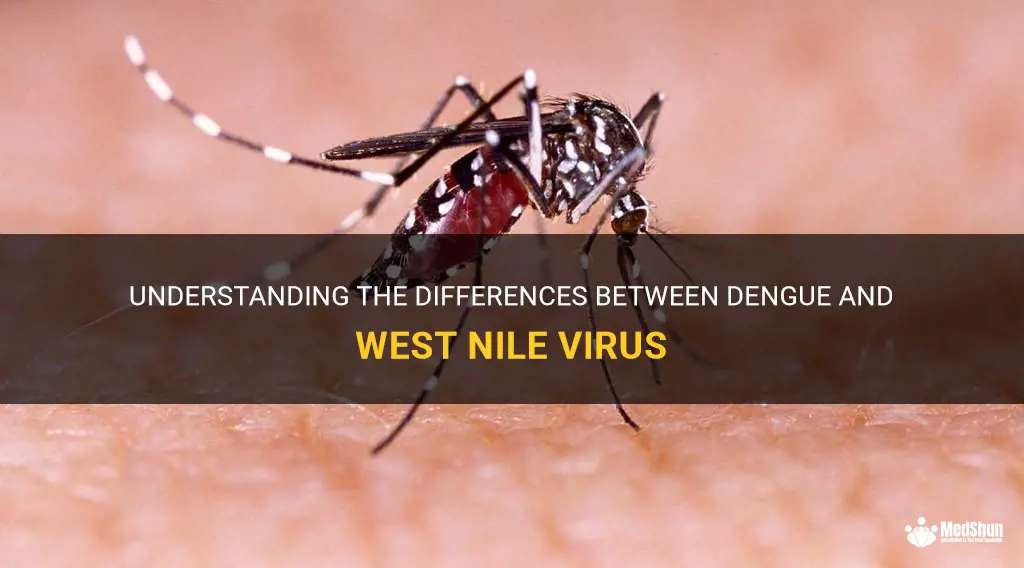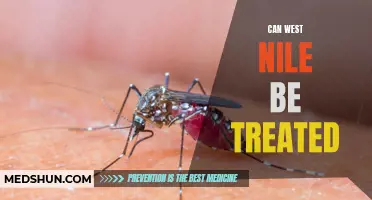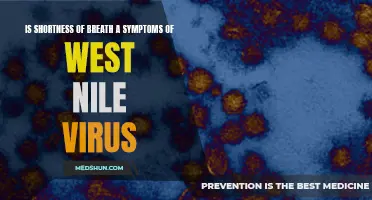
Dengue fever and West Nile virus are both mosquito-borne illnesses that have gained significant attention in recent years. While they share some similarities, they are caused by different viruses and have distinct characteristics. Understanding the differences and similarities between these two diseases is crucial for effective prevention and treatment strategies. In this article, we will explore whether dengue and West Nile virus are the same or if they are separate entities with unique traits.
| Characteristics | Values |
|---|---|
| Causative agent | Dengue virus and West Nile virus |
| Transmission | Mosquito bites, primarily Aedes mosquitoes for dengue and primarily Culex mosquitoes for West Nile virus |
| Geographic distribution | Dengue is found in tropical and subtropical areas, including parts of Africa, the Americas, Asia, and the Pacific. West Nile virus is found in Africa, Europe, the Middle East, North America, and West Asia. |
| Symptoms | Fever, headache, joint and muscle pain, rash, nausea, vomiting |
| Severe complications | Dengue can lead to severe dengue, including dengue hemorrhagic fever and dengue shock syndrome. West Nile virus can cause neuroinvasive diseases, such as encephalitis or meningitis. |
| Treatment | Supportive care, no specific antiviral treatment for dengue or West Nile virus |
| Prevention | Mosquito control measures, avoiding mosquito bites (using repellents, wearing protective clothing, etc.) |
| Vaccine | There is a vaccine available for dengue, but no vaccine currently available for West Nile virus |
| Public health impact | Dengue is a major public health concern in many tropical and subtropical countries. West Nile virus can cause outbreaks and has become endemic in some regions. |
What You'll Learn
- What are the similarities and differences between dengue and West Nile virus?
- How are dengue and West Nile virus transmitted to humans?
- Are the symptoms of dengue and West Nile virus similar, or are they different?
- Can dengue and West Nile virus be diagnosed using the same tests?
- Are there any specific treatments or vaccines available for dengue and West Nile virus?

What are the similarities and differences between dengue and West Nile virus?
Dengue and West Nile virus are two mosquito-borne diseases that can cause similar symptoms in infected individuals. Both viruses are transmitted by mosquitoes and can lead to serious illness, including fever, headache, and body aches. However, there are also some key differences between the two diseases that distinguish them from each other.
Similarities:
- Transmission: Both dengue and West Nile virus are transmitted to humans through the bite of infected mosquitoes. In both cases, the mosquitoes act as vectors, carrying the virus from infected individuals to healthy individuals.
- Symptoms: The initial symptoms of both diseases are often similar and include fever, headache, muscle and joint pain, and fatigue. This can make it difficult to differentiate between the two diseases based solely on symptoms.
- Geographic distribution: Both dengue and West Nile virus have a wide geographic distribution. They are found in various regions around the world, although dengue is more common in tropical and subtropical areas, while West Nile virus is more prevalent in temperate regions.
Differences:
- Virus family: Dengue and West Nile virus belong to different virus families. Dengue is caused by a flavivirus, while West Nile virus is a member of the Flaviviridae family. This difference in family classification can have implications for the development of vaccines and treatments.
- Vector species: The primary vector for dengue is the Aedes mosquito, particularly Aedes aegypti. In contrast, the primary vectors for West Nile virus are Culex mosquitoes, particularly Culex pipiens and Culex quinquefasciatus. This difference in vector species can influence the transmission and spread of the diseases.
- Severe manifestations: While both dengue and West Nile virus can cause severe illness, dengue is known to have more severe manifestations, such as dengue hemorrhagic fever (DHF) and dengue shock syndrome (DSS). These are potentially life-threatening conditions that can lead to organ failure and death. Severe neurological complications, such as meningitis and encephalitis, are more commonly associated with West Nile virus.
- Vaccine availability: Currently, there is a licensed vaccine available to prevent dengue, known as the Dengvaxia vaccine. However, there is no specific vaccine available for West Nile virus. This highlights the difference in the level of research and development for the two diseases.
In conclusion, dengue and West Nile virus are two mosquito-borne diseases that share similarities in terms of transmission and symptoms. However, they also have some distinct differences in their virus family, vector species, severity of illness, and vaccine availability. It is important to be aware of these similarities and differences in order to effectively diagnose, treat, and prevent these diseases.
Mosquito Species That Carry West Nile Virus: A Comprehensive Guide
You may want to see also

How are dengue and West Nile virus transmitted to humans?
Dengue and West Nile virus are both mosquito-borne diseases that affect humans. Understanding how these viruses are transmitted to humans is essential in developing effective prevention and control strategies.
Dengue, caused by the dengue virus, is primarily transmitted through the bite of the Aedes mosquito. The virus is present in the blood of an infected person and can be taken up by a mosquito when it feeds on them. The virus then undergoes an incubation period within the mosquito, during which it replicates and accumulates in the mosquito's salivary glands. Once the incubation period is over, the mosquito becomes infectious and can transmit the virus to humans when it feeds again.
The West Nile virus, on the other hand, is transmitted primarily by the Culex mosquito. Mosquitoes become infected with the virus when they feed on infected birds, which act as reservoirs for the virus. Similar to dengue, the virus undergoes an incubation period within the mosquito, allowing it to multiply and reach higher levels of virus in their salivary glands. Once the incubation period is complete, the mosquito can transmit the virus to humans and other animals through their bite.
It is important to note that not all mosquitoes are capable of transmitting these viruses. The Aedes mosquito species, including Aedes aegypti and Aedes albopictus, are the primary vectors for dengue transmission. Similarly, the Culex mosquito species, such as Culex pipiens and Culex quinquefasciatus, are the main vectors for West Nile virus transmission.
Apart from mosquito bites, vertical transmission (from mother to fetus) and transfusion with infected blood products can also contribute to the transmission of dengue and West Nile virus. However, these modes of transmission are less common than mosquito bites.
To prevent the transmission of dengue and West Nile virus, it is crucial to control the mosquito populations that serve as vectors for these diseases. This can be achieved through various measures, including larval source reduction, mosquito breeding site elimination, and targeted insecticide spraying. Individuals can also protect themselves from mosquito bites by wearing long-sleeved clothing, using mosquito repellents, and sleeping under bed nets. Additionally, efforts to detect and control infected birds, which act as reservoirs for the West Nile virus, can also help reduce transmission to humans.
In conclusion, dengue and West Nile virus are transmitted to humans primarily through mosquito bites. The viruses undergo an incubation period within the mosquito, allowing them to replicate and accumulate in the mosquito's salivary glands. Once the incubation period is over, the mosquito becomes capable of transmitting the virus to humans during subsequent bites. Understanding the transmission dynamics of these viruses is essential in developing effective strategies for their prevention and control.
Why Do West Nile Bites Cause Itching?
You may want to see also

Are the symptoms of dengue and West Nile virus similar, or are they different?
Dengue and West Nile virus are both mosquito-borne diseases that can cause significant illness in humans. While they share some similarities in terms of symptoms, there are also notable differences that can help distinguish between the two.
Both dengue and West Nile virus can cause flu-like symptoms such as fever, headache, muscle and joint pain, and fatigue. These symptoms can range from mild to severe and may last for several days to a few weeks. In some cases, both diseases can lead to more severe complications, such as dengue hemorrhagic fever or West Nile encephalitis, which can be life-threatening.
However, there are a few key differences between the symptoms of dengue and West Nile virus. One of the main differences is the presence of a rash. Dengue fever is characterized by a rash that typically appears a few days after the onset of fever. This rash is usually red and can be itchy. In contrast, West Nile virus infection typically does not cause a rash or only causes a very mild rash in some individuals.
Another difference is the prevalence of certain symptoms. While both diseases can cause fever and headache, dengue fever often presents with more intense and severe headaches, often described as "dengue fever headache." Additionally, dengue fever is often associated with severe body aches and pain, earning it the nickname "breakbone fever." These symptoms are less commonly seen in West Nile virus infection.
Laboratory tests can also help differentiate between dengue and West Nile virus. Dengue fever can be confirmed through laboratory tests that detect the presence of dengue-specific antibodies or the virus itself. Similarly, West Nile virus can be detected through laboratory tests that identify the virus or specific antibodies. These tests are typically performed on blood samples.
In conclusion, while dengue fever and West Nile virus share some similar symptoms, there are also notable differences that can help differentiate between the two. The presence of a rash, the severity of headaches and body aches, and the results of laboratory tests can all provide valuable clues in determining the specific virus causing the illness. If you suspect you may have either dengue or West Nile virus, it is important to seek medical attention for a proper diagnosis and appropriate treatment.
The Impact of West Nile Virus on Muscles: Understanding the Effects
You may want to see also

Can dengue and West Nile virus be diagnosed using the same tests?
Dengue and West Nile virus are both mosquito-borne diseases that can cause significant health problems in humans. Both viruses belong to the Flavivirus genus and share similar clinical symptoms, such as fever, headache, muscle and joint pain, and rash. However, when it comes to diagnosis, the tests used for dengue and West Nile virus are not the same.
The most commonly used diagnostic test for dengue is the reverse transcription-polymerase chain reaction (RT-PCR) test. This test detects the presence of the dengue virus’s genetic material (RNA) in a person’s blood sample. The RT-PCR test can determine the specific serotype (strain) of the dengue virus, which is important for patient management and surveillance purposes. In addition to RT-PCR, other tests for dengue include enzyme-linked immunosorbent assay (ELISA) and rapid diagnostic tests (RDTs) based on the detection of dengue-specific antibodies in the blood.
On the other hand, the tests used to diagnose West Nile virus are different from those used for dengue. The most commonly used test for West Nile virus is called the nucleic acid amplification test (NAAT). This test detects the presence of the West Nile virus’s genetic material (RNA) in a person’s blood or cerebrospinal fluid. Similar to the RT-PCR test for dengue, the NAAT test can determine the specific strain of the virus.
In addition to NAAT, other tests for West Nile virus include serological tests such as ELISA and plaque reduction neutralization tests (PRNT). These tests detect West Nile virus-specific antibodies in the blood, which are produced by the immune system in response to the infection.
It is important to note that while the diagnostic tests for dengue and West Nile virus are not the same, they are based on similar principles. Both tests rely on the detection of the virus’s genetic material or the body’s immune response to the infection. However, the specific assays used and the laboratory techniques involved may differ.
In conclusion, dengue and West Nile virus cannot be diagnosed using the same tests. The diagnostic tests for dengue and West Nile virus are specific to each virus and are based on the detection of the virus’s genetic material or specific antibodies. It is crucial for healthcare professionals to be aware of the differences in diagnostic tests in order to accurately diagnose and manage patients with either of these mosquito-borne infections.
The Impact of West Nile Virus on Young Children: Understanding the Risks and Effects
You may want to see also

Are there any specific treatments or vaccines available for dengue and West Nile virus?
Dengue and West Nile virus are both diseases caused by viral infections transmitted by mosquitoes. While they share some similarities in terms of symptoms and transmission, the treatments and vaccines available for each disease differ.
Dengue is a viral infection caused by the dengue virus, which is primarily transmitted by mosquitoes of the Aedes aegypti species. There is currently no specific antiviral treatment for dengue. Instead, management of the disease mainly focuses on supportive care to relieve symptoms and prevent complications. This may include ensuring adequate hydration, controlling fever with antipyretics, and monitoring for any signs of severe dengue such as bleeding or organ damage. In severe cases, hospitalization may be required, and intravenous fluids and other supportive measures may be administered. Research is ongoing to develop antiviral drugs specifically targeting the dengue virus, but no specific treatment has been approved for routine use yet.
In contrast, there is currently no antiviral treatment specifically approved for the treatment of West Nile virus infection. Most individuals infected with West Nile virus experience mild symptoms or no symptoms at all, and they recover on their own without medical intervention. However, in more severe cases where neurological complications develop, hospitalization and supportive care may be necessary. This may involve intravenous fluids, pain medication, and treatment for complications such as encephalitis or meningitis. Often, the focus is on managing the symptoms and providing supportive care rather than directly targeting the virus.
In terms of vaccines, there is currently no licensed vaccine available for dengue in the United States. However, several dengue vaccine candidates are under development, and a few have been licensed for use in certain countries. The most widely available dengue vaccine is currently the Dengvaxia vaccine, developed by Sanofi Pasteur. It has been approved for use in several countries but is recommended only for individuals who have previously been infected with dengue to prevent severe complications. In individuals who have never been infected with dengue, the vaccine may actually increase the risk of severe disease upon subsequent exposure to the virus.
Similarly, there is currently no licensed vaccine available for West Nile virus. Several vaccine candidates are under development, but none have been approved for routine use yet. The best defense against West Nile virus infection is to prevent mosquito bites by using insect repellents, wearing protective clothing, and avoiding areas with high mosquito populations. Additionally, efforts to control mosquito populations, such as removing standing water and using larvicides or insecticides, can help reduce the risk of transmission.
In conclusion, while there are no specific antiviral treatments or vaccines approved for dengue and West Nile virus, supportive care can help manage symptoms and prevent complications. Vaccines for dengue and West Nile virus are still in development and are not yet widely available. The best approach to preventing these diseases is through mosquito control measures and personal protection against mosquito bites.
Understanding the Risk: Can Horses Still Contract West Nile Virus After Receiving Their Yearly Shot?
You may want to see also







